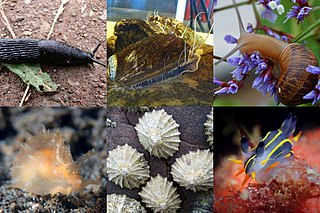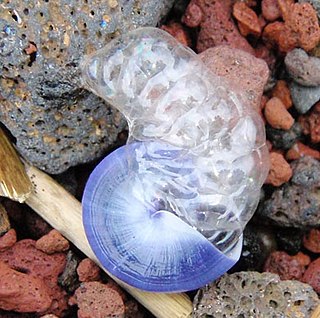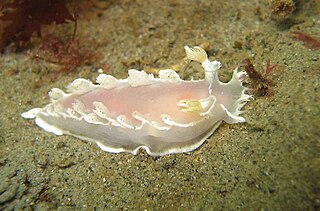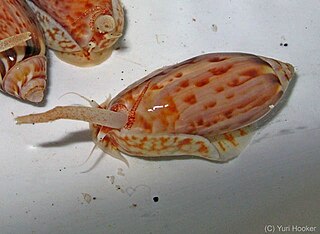Related Research Articles

Gastropods, commonly known as slugs and snails, belong to a large taxonomic class of invertebrates within the phylum Mollusca called Gastropoda.

Sea slug is a common name for some marine invertebrates with varying levels of resemblance to terrestrial slugs. Most creatures known as sea slugs are gastropods, i.e. they are sea snails that, over evolutionary time, have either entirely lost their shells or have seemingly lost their shells due to having a significantly reduced or internal shell. The name "sea slug" is often applied to nudibranchs and a paraphyletic set of other marine gastropods without apparent shells.

Hypsogastropoda is a clade containing marine gastropods within the clade Caenogastropoda.

Acroloxidae, commonly known as river limpets, are a taxonomic family of very small, freshwater snails, aquatic pulmonate gastropod limpet-like mollusks with a simple flattened conical shell in the clade Hygrophila.

Nacellidae is a taxonomic family of sea snails or true limpets, marine gastropod molluscs in the subclass Patellogastropoda.

Thiaridae, common name thiarids or trumpet snails, is a family of tropical freshwater snails with an operculum, aquatic gastropod mollusks in the superfamily Cerithioidea.
The taxonomy of the Gastropoda as it was revised in 2005 by Philippe Bouchet and Jean-Pierre Rocroi is a system for the scientific classification of gastropod mollusks. The paper setting out this taxonomy was published in the journal Malacologia. The system encompasses both living and extinct groups, as well as some fossils whose classification as gastropods is uncertain.

Murchisoniidae is an extinct family of fossil gastropods in the superfamily Murchisonioidea.

Eucyclidae is a family of gastropods in the superfamily Seguenzioidea.

The Ptenoglossa is an informal taxonomic group of sea snails. This group was considered paraphyletic or polyphyletic by Ponder and Lindberg (1997) in their classification of gastropod molluscs.

The Cladobranchia are a taxonomic clade of nudibranchs, sea slugs, marine gastropod molluscs in the clade Dexiarchia.

Eotomarioidea is an extinct superfamily of small to large sea snails, marine gastropod mollusks in the clade Vetigastropoda.
Murchisonioidea is an extinct superfamily of small to large sea snails, marine gastropod mollusks in the clade Vetigastropoda.

Olivoidea is a taxonomic superfamily of minute to medium-large predatory sea snails, marine gastropod mollusks in the order Neogastropoda.
†Oriostomatoidea is an extinct superfamily of fossil sea snails, marine gastropod mollusks in the clade Neritimorpha.

The Harpidae, known as the harp snails, are the members of a taxonomic family of large predatory sea snails, marine gastropod mollusks.

Sinuopeidae is an extinct family of fossil sea snails, Paleozoic gastropod mollusks.

Trochonematoidea is an extinct taxonomic superfamily of fossil sea snails, marine gastropod molluscs.

Trochonematidae is an extinct taxonomic family of fossil sea snails, marine gastropod molluscs in the superfamily Trochonematoidea.

Lomanotidae is a family of sea slugs, marine gastropod mollusks in the superfamily Tritonioidea.
References
- ↑ Bouchet, P. & Rocroi, J.-P. (2005). "Classification and Nomenclator of Gastropod Families". Malacologia. 47 (1–2).
- Koken, E. (1896). Die Gastropoden der Trias um Hallstadt. Jahrbuch der Kaiserlich-Königlichen Geologischen Reichsanstalt. 46(1): 37−126
- Paleobiology database info